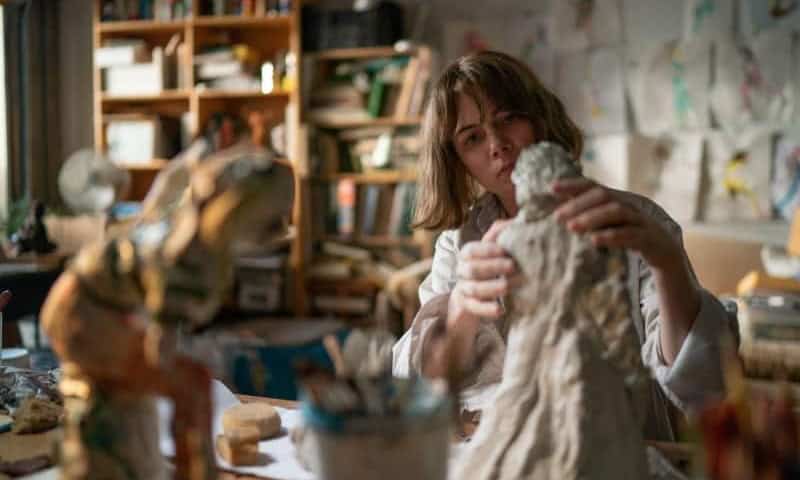Kelly Reichardt’s ‘Showing Up’ Captures the Labor & Challenges of Creating Art
Michelle Williams gives one of the year’s best performances as a sculptor dealing with the struggles of daily life.

As part of our coverage of the 60th annual New York Film Festival, Will DiGravio reviews Kelly Reichardt’s Showing Up. Follow along with more coverage in our New York Film Festival archives.
No summary of the year’s best films will be complete without Showing Up, the latest from writer-director Kelly Reichardt. Quiet yet suspenseful, funny, and deeply probing, the film offers a portrait of the artist at work. But the film does not exalt its protagonist, a sculptor named Lizzy Carr (Michelle Williams), in that pretentious way movies often depict artists. Nor does it steer us into the usual cliches. Lizzy is not elbowing everyone in the face on her way to art school in Paris, for example. And never does the film try to separate art and humanity or suggest that the former somehow exists outside the latter. Showing Up foregrounds the humanity, offering an affective tale about making art in the presence of a banal, inhospitable existence.
Williams gives a revelatory performance as Lizzy. The film begins with Lizzy imploring her landlord Jo (Hong Chau), to fix her hot water. Jo says she will but never does and instead becomes consumed by two upcoming art shows of her own. Yes, Jo is that rare combination of landlord and artist, and she is a far more “successful” artist than Lizzy. She has more shows, produces more work, and has a larger reputation. She also, unlike Lizzy, does not have a day job. Her family helped renovate the row of condos she now owns, thus making it so she could earn passive income while focusing on her art. It must be nice.
Lizzy, by contrast, works at the local art school in Oregon, with her mother (Maryann Plunkett) as the boss. Her parents are divorced. Lizzy’s dad (Judd Hirsch), a former artist, is only in the picture through Lizzy’s efforts. And her brother (John Magaro) lives alone and suffers from some kind of paranoia and mental illness, which her mother denies exists, thus leaving Lizzy as the sole person to worry about. Between work and family dysfunction and no hot water, Lizzy also creates her own art and faces a deadline for a small, upcoming show of her own.
Reichardt, who co-wrote the script with Jonathan Raymond, creates a tremendous atmosphere throughout the film. Whether on campus, in the office, at the studio, or at Lizzie’s home, each of these spaces carries with them a palpable mood. And the vibes come to affect Lizzy and us. It becomes apparent how existing in these spaces day after day, with their patterns and the same rotating cast of characters, who are both sweet and annoying as hell, impacts a person.
The dynamic between Jo and Lizzy exists in each of these spaces and carries with it a different context each time. The film brings to the forefront the ways in which Jo’s financial and family situations give her the flexibility to create. Often, art is a byproduct of circumstance, not just talent. Jo, though, is no villain. Lizzy makes situations worse with her own demeanor. She makes Jo a scapegoat for her own guilt, fear, and anger. One could imagine a version of this film from Jo’s perspective that felt just as true.
Showing Up brings to the forefront the physical and emotional labors of art. The camera sits on Lizzy as she sculpts and thinks and tries to bring her mind elsewhere. We watch as Jo executes the construction of her own exhibit, showing how often one might take for granted even the smallest gallery space. The film extracts this unseen labor in a thoughtful and deliberate way. Similarly, the film itself is textured with small details of its own. Williams, in particular, comes to embody her character in a way that gives every glance, facial expression, or shift in posture a new meaning. We are so finely attuned to Lizzy’s disposition that each gesture translates across the screen.
The focus on details, on the small stuff, comes through in the film’s subplot. The frustrations with family and friends Lizzy feels comes not after some big blowup or event but after days and months, and years of the same old crap. Her dad keeps telling the same tired lies and stories. Her mother keeps denying her brother needs help. Jo still won’t fix the hot water because she is too busy, and the parts are back-ordered. It is the same story again and again. Reichardt and Williams capture the ways in which these small things compound over time. It is a deeply moving and relatable approach that feels so real.
As such, the film feels acutely aware of its audience. It plays with the cliches of stories similar to this one. Reichardt brings us right to the edge of familiarity before shifting. Showing Up constantly plays with our expectations and, in doing so, only elicits a stronger, more profound reaction to its depiction of the unvarnished artistic life. The film strikes a key balance. It shows why art is worth doing without that all-too-common indulgent romanticization of the artistic process.